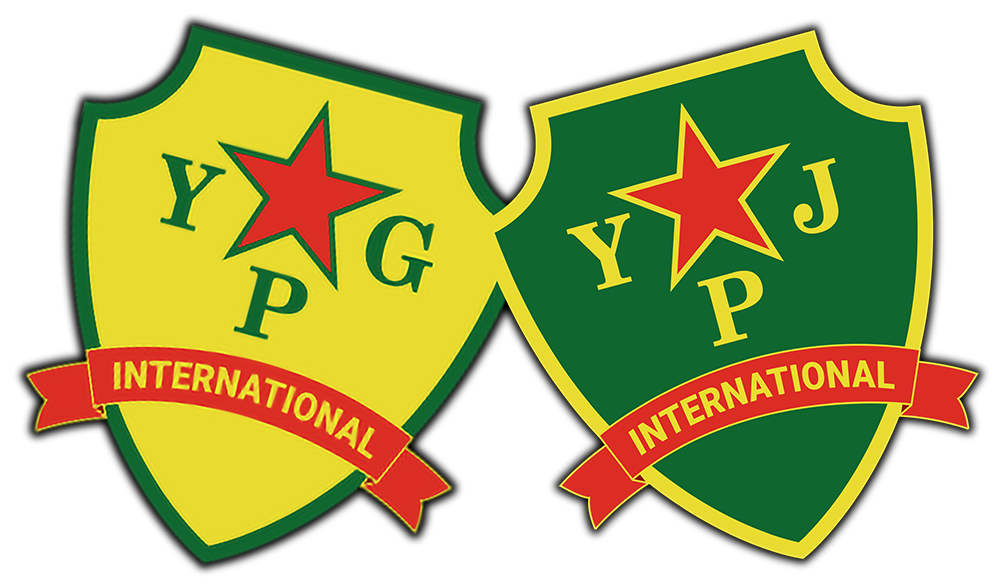Ş. Firaz Dağ – Ş. Gabar Légionnaire
We remember our Şehîds of September
We want to remember our Martyrs of September – Ş. Gabar Légionnaire and Ş. Firaz Dağ – who both fell in the battle of Raqqa fighting the inhumanity and cruelty of ISIS with all that they had.
In 2015, a wave of terrorist attacks by extremist Islamist groups hit Europe. The deadliest of these, the November 13, 2015 attacks in Paris, claimed 130 lives and injured 413. This attack was carried out by the Islamic State. These attacks had a profound effect on Şehîd Gabar. “My mind is still full of the images near the Stade de France, filled with fire trucks and flashing blue lights of police cars, the memory of the bloodied cafe terraces, of the bodies on the pavement, covered with improvised shrouds and of the colorful facade of the Bataclan, that temple of music and joy, out of which were taken scores of dead and wounded. I can still hear the sirens of the ambulances speeding toward the hospitals and the comments of the journalists, adding their own amazement to the testimony from the witnesses. The terrorists struck all out, targeting only the innocent. With no other justification than their conception of life not being that of their victims.”
Unlike other international volunteers, Ş. Gabar was not initially interested in the revolutionary project in Rojava when he got in contact with the YPG through the Lions of Rojava Facebook page. He was a former soldier in the French Foreign Legion and he came to fight the Islamic State. “Having been a Legionnaire for fifteen years, I know about war. I thought I was done with it, since I don’t consider that tearing each other apart is mankind’s inevitable destiny.” But after the Bataclan attack, he could no longer sit back in his quiet and comfortable life. “I decided that since they had come here, in my country, to assassinate people who had done them no harm, I would go find them in their phantom State and make them pay the price of blood.”
A deeply practical person, and from a background that was not amenable to left-wing revolutionary politics, Heval Gabar eschewed the political and ideological education that the YPG provides its fighters. But nonetheless he could not help but be impressed by the values and practice of the revolution. “What I know of this project, I learned during my exchanges with the YPG and even more in seeing the behavior of the men and women making up the ‘taburs’, the equivalent to our sections. And it was in seeing them in action that I realized that the society the PYD meant to build suited me rather well.” Determined to go and fight Daesh on the frontlines, he encountered on many occasions a desire by the YPG to protect him and keep him back from the fighting because of his age, which “although stemming from a generous intent” he found “unbearable.” He eventually got his wish and participated in the operation to liberate Minbic. During a firefight which saw one YPG fighter killed and three wounded, Heval Gabar was shot twice, with one bullet grazing his neck and the other shattering his heel. Too badly wounded to carry on fighting, he was carried to safety from Minbic on the back of comrades. He was taken to a hospital in Kobanê where he says “the medical staff shows unmatched devotion. But they lack medication, vaccines, bandages. In fact, they lack of everything. I was sewn up without anesthesia and cared for as best they could. I stayed for three weeks, and fearing that gangrene would set in, I decided to go back to France.”
Back in France, he received the necessary medical treatment and all the while planned his return to Syria. Despite his refusal of all ideological education, his time amongst the revolutionary movement had a profoundly positive effect on his character. One of his fellow comrades reflected: “He was deeply impressed by the female fighters we were in contact with, and he soon let go of his dirty jokes and showed a growing respect for women. I must admit that the transformation of his personality left a deep impression on me. […] When I saw him change, I saw before my eyes the strength of the revolution, the ability to change someone, to change the world.” While he had certainly gone to Rojava at first driven by a hatred of ISIS, his return was fueled by a love of the people there. He returned to Rojava in August of 2017, and despite his injured foot giving him great pain, he persevered. He joined the operation to liberate Raqqa and on 7 September 2017 he was martyred while clearing a building with his team. In the words of his fellow comrade: “he gave his life for humanity, for the freedom of a land that was not his own, for the revolution.” According to his own wishes, his body was laid to rest in the earth of Rojava.
Ş. Firaz was born in the Elbistan district in Northern Kurdistan. When he was a young boy, his family moved to London, UK to escape the violence and persecution against Kurdish people by the Turkish state. As a youth, he frequently visited the Kurdish Community Centre in Harringey, North London, where he began to develop his lifelong connection to the Kurdish freedom struggle. A bright and hardworking student, he attained a first-class honours degree in Film Studies at Queen Mary University and a master’s degree in filmmaking at Goldsmiths University. He used his skills in media to tell the stories of the struggle of the Kurdish people and the revolution in Rojava, setting up the influential website Kurdish Question and an internet news portal called The Region. He produced award-winning short films which expressed his ideas about the world. He was deeply involved in internationalist anti-imperialist organising. He was active in many creative and artistic fields such as writing, film-making, literature and poetry. Amidst the attack on Kobanê, he led solidarity demonstrations of Kurdish people and their supporters in London. He was a tireless activist in the solidarity movement to support the socialist and feminist revolution in Rojava. He began to feel that his efforts to support the struggle in Rojava were not enough. After the 25 April 2017 Turkish airstrike against the YPG base on Mount Qereçox, in which several members of the YPG Press Office were martyred, he decided he could better put his talents to work telling the stories of the revolution on the ground in Rojava. He took on the nom-de-guerre Firaz Dağ – “Firaz” in honour of his uncle who was martyred as a guerrilla fighting against the Turkish occupation in the 90s – “Dağ” in memory of Halil Dağ, a Turkish journalist who came to the mountains of Kurdistan to document the lives of the guerrilla, and ultimately became a guerrilla himself, before falling Şehîd in a clash with Turkish forces in 2008.
From arriving in Rojava in summer 2017, Heval Firaz dedicated himself wholly to the task of showing the heart of the revolution to the people of the world. He published works in English in many forms on various social media and news websites, as well as liaising with the international press. With a rifle, a camera and a laptop, he followed the fighters of the YPG/YPJ to some of the most dangerous fronts of the War Against Daesh, in Deir-Ez-Zor and Raqqa. Fearing the work that the YPG Press Office was doing to shine a light on both the revolution in Rojava and the reactionary barbarism of Daesh, ISIS ordered a targeted attack against the media arm of the YPG. On 26 September, three pickup trucks full of fascists dressed in captured SDF uniforms launched a surpise attack, overwhelming the defences at the Raqqa Media Centre. Şehîd Firaz was shot dead alongside five other YPG fighters. The ISIS attackers were killed in the ensuing firefight.
Şehîd Firaz was honoured at a martyr’s ceremony in Derik which was attended by thousands of mourners, alongside 3 other fighters who were killed in the operation to liberate Raqqa. Speaking on behalf of YPG General Press Centre, Zana Cudî said: “Our Comrade Firaz was an
example of sacrifice, and he created a new, free and dignified life for us on the Northern Syrian lands. We promise that we will continue on Firaz’s path and will carry his camera, gun and pen forward.” More than 2,000 people gathered to view the ceremony in Derik live at the Kurdish Community Centre in North London where he had spent so much of his youth. Addressing the crowds who had gathered to bid farewell to her son, his mother Zeynep spoke. “I did not realize just what kind of son I had raised. I truly got to know my son in these past five days. I will always be on my feet from now on. I will not cry. Always, always, always. I will always stand behind you, my son. I love you all so much for making me get to know my son. I did not
realize just what kind of a beautiful son I had until these past five days.”
ŞEHÎD NAMIRIN!

